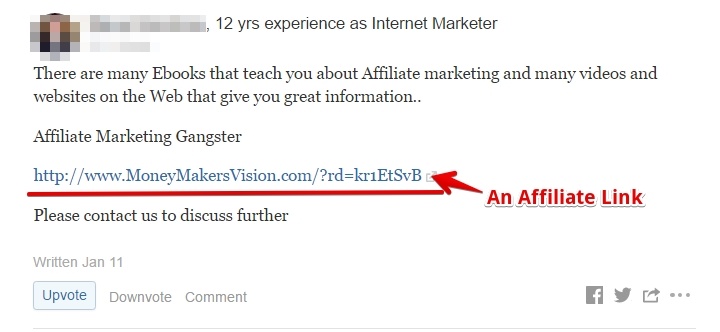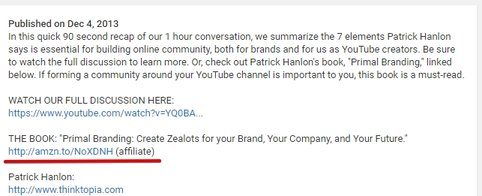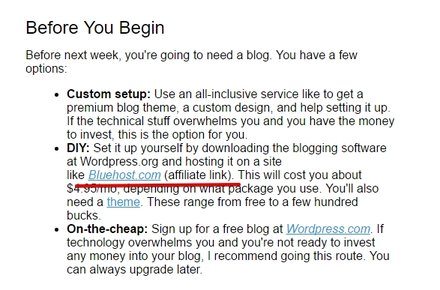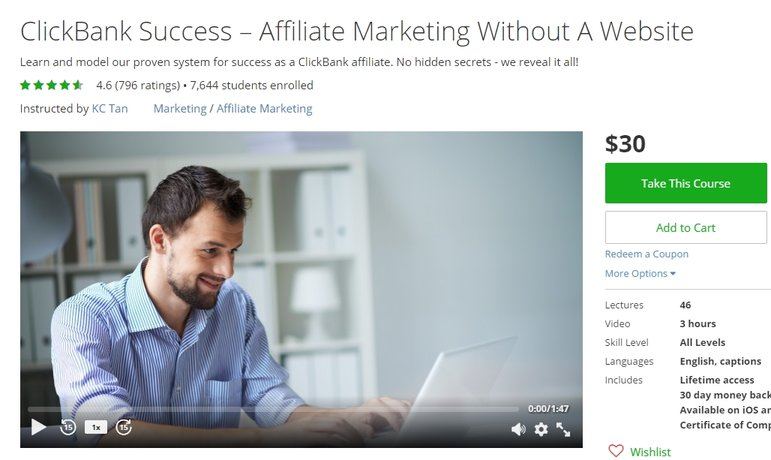 When a friend asked me this question, my straightforward answer was yes. It was one of the few things that I learned when I started my online business in 2014 and I didn’t think that it was an exception. I know that the technicalities of setting a website and optimizing for the search engines can be a steep learning curve for some people.
When a friend asked me this question, my straightforward answer was yes. It was one of the few things that I learned when I started my online business in 2014 and I didn’t think that it was an exception. I know that the technicalities of setting a website and optimizing for the search engines can be a steep learning curve for some people.
So, do you actually need a website for affiliate marketing? Here are some of my personal views.
Is It a Legal Requirement?
After hours of researching, from Wikipedia to the Federal Trade Commission (FTC) Guides, I actually can’t find a single legal statement that reads or suggests that you MUST have a website in order to become an affiliate marketer. Besides that, there are no fixed standards to abide by (not that I know of); only a ton of guides and advise coming from experienced marketers.
The lack of these rules and regulations seems to subject the industry to various interpretations. One of which is that you don’t need a website and to some degree of exaggeration, you can make a lot of money online without one.
In other words, you are putting the affiliate link directly in front of the viewers and getting them to click on it. In order to generate a big amount of sales commissions, these links must then be published frequently to increase their visibility.
Ways Marketers Promote Without a Website
When using a non-website platform for promotion, one has to think about 1) Where your audience is and 2) How to get them to click on your links.
Contrary to what you may think, most of these advertising methods are actually legit, but they don’t necessarily produce the result that you want in the modern online marketing landscape.
1) Online Forums
This is probably one of the most popular ways of dropping affiliate links. In the past, one would enter a discussion thread and sign off with a signature image that links directly to a product promotion on a merchant’s site.
Needless to say, this method is pretty outdated and scorned as an act of personal gain. Even in a well-respected platform like Quora, some people will still take the advantage to leave so-called ‘helpful’ links, which are actually their affiliate links in disguise.

Pros – Most forums are free to join so there’s really no cost of investment on your side.
Cons – However, most forums have rules that prohibit spamming so make sure you read through them first. If you are ‘actively’ posting links regardless of the topic of discussion, you may get flagged or worse, banned from the member’s area.
2) Classified Sites
Classified website is another online place where you can place ads based on your locality. The main aim is to target the audience within your vicinity and to establish a business or working relationship. Is it relevant to affiliate marketing?
Well, not really. But it’s a free marketing platform (most of them are anyway) so some people may find that convenient. Out of curiosity, I ran a quick search about ‘online jobs in Las Vegas’ on Craigslist and here’s an advertisement that caught my attention.

The content is pretty much a call-to-action intending to lead you to a product via the affiliate link – not exactly the typical local ads that you would see.
Pros – Again, this is a free platform to join.
Cons – No one really monitors what goes in and out of the listing. As a result, these kinds of sites are full of spammy ads – whether they are local or affiliate businesses – which makes viewers more wary about the legitimacy of these ‘opportunities’.
3) Video Marketing
For people who prefer visual engagement, video platforms like YouTube are the go-to place for promoting a product. Although YouTube’s terms and conditions do not clearly forbid the use of affiliate links, marketers are advised to publish only relevant content that offers value and NOT to use the platform solely for financial gains.

In the example above, the promotion is very subtle and you would only see the affiliate link if you choose to read more in the description area. Even so, the marketer clearly indicates that he’s an affiliate which provides more transparency to the viewers.
Pros – Besides the free video hosting service, you can also make money on YouTube based on the size of your audience and this is always a nice additional income to have.
Cons – There are a lot of things that go into good video production – personal skills, creativity, time and gadgets – way more than creating a website. Often times, you have to build your audience first before you can expect to monetize at a large scale.
4) Email Marketing
This method is more targeted because you’d actually be advertising directly to potential customers through their personal emails. In the promotional content – whether it is a newsletter or an eBook, the marketer would clearly state his affiliation and offer a link for you to follow through.

Pros – A more personal method of advertisement and highly profitable if done right.
Cons – Getting and sending emails in bulk is the tricky process. Without a website or an autoresponder subscription, you might go down the route of buying email lists which can do more harm than good. And if you don’t have an autoresponder, get ready to do a lot of laborious emailing stuff yourself.
5) Paid Traffic
Paid advertising is another targeted way to reach out to your audience on search engines or on social platforms.
You would create a sales page (a webpage rather than a website) and bid on certain keywords to compete for the most visible spot that attracts the most readers. When someone clicks on this ad, it would lead them to that page where your affiliate link resides.
Despite the dwindling popularity, there are still places that teach you how to create and promote sales pages without the use of a website. This class in Udemy is one of them.

Pros – You can focus your marketing effort in targeting specific audiences online.
Cons – You do need to have a good grasp of keyword research (and a lot of money) before you invest in this channel. It works very well with digital product promotions, but in most cases, physical product companies will not allow you to bid on certain keywords because it’s considered as an act of trademark poaching.
But Why Creating a Website Is More Important
Apart from advertising on low-quality sites, video marketing, email marketing, and paid traffic can be highly successful IF you’ve covered your groundwork properly. Understanding your niche and analyzing good quality keywords, prior to using all these advanced marketing channels, will help you appreciate what online traffic is all about.
In my opinion, the best way to put this skill into practice is to write your own content and promote them through YOUR OWN WEBSITE as you reap other advantages along the process;
- You are able to offer helpful information to other people instead of just selling products.
- The search engines will find your content and rank your site for various keywords, thus offering more exposure for your marketing effort.
- It humanizes your brand as compared to some random ad listings.
- Getting approved for reputable affiliate programs such as the Amazon Associate is a lot easier.
- You don’t have to rely on other people’s platforms for your promotion.
- You can obtain good quality emails to build your own audience.
- When you own a website, you have a business asset that appreciates in value over time.
So although it’s not a prerequisite, your affiliate links will convert much better in that manner over a long period of time when they are placed strategically on a website.
Here’s the Good News…
It’s actually not difficult to create and frankly, not that expensive to maintain a website either. If you choose a platform that’s optimized for the search engines like WordPress, your site can go live within minutes. As long as you keep publishing good content on a regular basis, you would be making steady affiliate commissions for years to come.
If you are looking for a reliable web publishing and hosting solution, read my personal recommendation about SiteRubix in this review.
Do you have any thoughts or questions about this topic? Just drop me a comment below and I’ll get back to you.

Cathy – what great research you’ve done here. I appreciate it so much. You go into such detail. I had not ever even imagined one could do affiliate marketing without a website of their own. Well, frankly, it doesn’t appear that it can be done very well. But at least now I feel like I understand a lot more about those avenues you explored, and how they might work. I am sticking with my WordPress website though. It is hands down the easiest, most liberating way, as you suggest!
I am glad to know that you gained some knowledge from this article, Leah. There are so many advantages to owning a business website – it’s a shame to not learn how to create one.
I would have to agree that you really do need a website for affiliate marketing. Yes, you can market all the different ways you listed. But I see having a website as more legitimate. I am not going to buy something from someone through an ad that they placed somewhere or even a video. I think that having a website gives a sense of legitimacy to it.
Yup, totally agree with you on that. I think by owning a website, you’ll give more consideration towards your reader’s need while providing a viable platform for them to communicate with you.
Hi Cathy,
I did not realize there were so many ways to promote a website,I only use one way to promote a website and that is through a program called, Wealthy Affiliate which I happen to notice this from your website.
I’m not really interested in the other techniques you mentioned as it seems like a lot of work for little return.
Hi Sonny, I think you have misunderstood the message of this article. The last three methods – video marketing, email marketing and paid traffic – are very effective to promote your business if done right. They would require additional investment in tools and gadgets, though.
In their advanced courses, Wealth Affiliate provides some very in-depth training on PPC campaign, but this is something that you might consider after having a good grasp on keyword research and organic traffic.
This was an interesting and informative read! There are so many ways to make money with affiliate marketing that I was not aware of over having a website.
The subject of the article as to whether you do need a website for affiliate marketing is what attracted me to get here, and the ideas over and in addition to having a website were useful for me.
Having said that, I agree with you that a website has many advantages over using one of the other methods of promoting products as an affiliate. Solid article and information!
Everything you have stated in your article all makes perfect sense. I can see your point of view to why an actual website will outweigh the constant affiliate links around the internet in different locations trying to make money.
Having a website will work out better after its ranking picks up and you can still use the other methods from the ones you want using your site. After a while, your website will rank and give you the traffic you need.